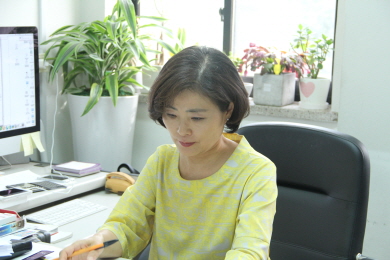
Her passion towards autism began during her high school years when she did a volunteer work at a center for children with special disabilities. Communicating with autistic children, she soon formed a sense of connection. However, she was soon faced with the disapproval of her homeroom teacher who refused to sign her application for the special education major at Ewha, insisting her to apply for a humanities major.
“I remember crying at the restroom so long when my teacher did not allow me to apply,” Lee recalled. “At last, my mother came to school and got the signature after a long fight. In the end, my teacher did not put my name on the list of successful applicants displayed in front of the main gate. To him, special education major was not a source of pride to the school. I am worried if this sort of prejudicial atmosphere still exists in current high schools.”
Professionally pursing the field of special education, she realized that autistic children have much potential to become a normal member of society. After many research, Lee slightly shifted her focus from education to rehabilitation.
“An autistic child is no different from you,” Lee stressed. “The welfare policies should not be limited to simply giving money, and rather focus more on considering how to incorporate them into social society, encouraging each one’s talent.”
Based on such research, she devised a model that nurtures autistic children into designers, as they can be more apt in visual communication thus having more chances of processing artistic talent.
However, she was faced with a scholar’s dilemma.
“Although I devised a rehabilitation model, it occurred to that the theoretical model would not be applied to the real world unless I acted upon it,” Lee said.
While having such inner conflicts, her model was selected in the Easter Project supported by Ewha’s University Industry Cooperation and SK Planet, and was provided with support fund to find and operate a social enterprise under the name “Autistar” in 2012. All of a sudden, she was able to bring her enterprise model in reality, proving that such rehabilitation is possible.
Autistar, consisting of a design school and a design enterprise aims to provide free design education and opportunities and contributes to the society. Four official designers of Autistar who are autistic design various products ranging from file holders to umbrellas and candles. They come and leave the workplace at a designated time and are paid monthly salaries just like normal workers. Professor Lee takes charge of every process as the CEO. She decides sales items, reviews designs, contacts factories manages financial condition and runs around to have more markets.
“At first, I thought of quitting hundreds times a day,” Lee said. “Even when going to sleep, I used to jump out of bed in fear and anxiety. I never had interests in anything other than research. Living as a CEO under the responsibility for the company and workers posed such incompatibility and change in life.”
However, she persisted on because she could not send the autistic designers back home, leaving them once again jobless. She kept on because she wants to show a model that can utilize autistic people as useful resources of our society. Although Lee neither enjoys being a CEO nor seeks for profits through Autistar, she wants it to be an example model that future social enterprises or corporations can widely copy and use.
Having survived the first three years, Ausitar has gotten positive feedback not only for its aims, but also for the their products. Lee sees designer’s unique perspective as the source for Auistar’s success.
“Autistic children do not know competition nor other complex feelings such as egoism or inferiority,” Lee explained. To their eyes, the world is simply a bright and warm place. If you look at their drawings, they are all brightly-colored and only depict positive, happy things. Even if they are told to draw something scary or dark like a shark, they still draw a shark in a pink color, smiling. Their own affectionate way to perceive and depict the world touches people.”
She is currently inventing a donation platform called “Sharing Twice” which can benefit two organizations from one donation. It is a system in which people buy products from social enterprises like Autistar and the enterprise donates its products to those who need it, such as an orphanage. In this way, not only the recipients but also social enterprises which are all benefited.
“Some advised me to register the patent of Autistar and Sharing Twice,” Lee said. “However, what I eventually want is autistic children to have dreamful lives with more organizations and opportunities like ours. Until then, I will do my best to grow Autistar.”
Kim Hye-won
kimhyewon@ewhain.net

